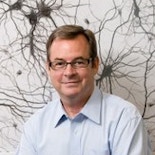
Richard Huganir is a Bloomberg Distinguished Professor and Professor and Director of the Solomon H. Snyder Department of Neuroscience at the Johns Hopkins University School of Medicine. He Paulreceived his Ph.D. degree in biochemistry and molecular and cell biology from Cornell University in 1982 where he performed his thesis research in the laboratory of Efraim Racker. He was a postdoctoral fellow with the Nobel Laureate Paul Greengard at Yale University School of Medicine from 1982–1984. Huganir then moved to Rockefeller University where he was an assistant professor of molecular and cellular neurobiology from 1984–1988. He moved to the Johns Hopkins University School of Medicine in 1988 as an associate investigator in the Howard Hughes Medical Institute and an associate professor in the Department of Neuroscience. He became the director of the Solomon H. Snyder Department of Neuroscience in 2006.
Huganir’s research is focused on mechanisms that regulate synaptic transmission and synaptic plasticity. Studies from his laboratory have shown that modulation of the function of neurotransmitter receptors is a major mechanism for the regulation of neuronal excitability and connectivity in the brain and is critical for many higher brain processes, including learning and memory, and is a major determinant of behavior. Moreover, dysregulation of these mechanisms underlies many neurological, psychiatric and neurodevelopmental conditions, including Alzheimer’s disease, amyotrophic lateral sclerosis, schizophrenia, autism, intellectual disability, post-traumatic stress disorder, chronic pain and drug addiction.
Huganir is a member of the Scientific Advisory Board of the Stanley Center for Psychiatric Research at the Broad Institute and a recent member of the National Institute of Mental Health Council and the National Institutes of Health (NIH) Brain Research through Advancing Innovative Neurotechnologies (BRAIN) Initiative Multi-Council Working Group. He has served as the both the president and the treasurer of the Society for Neuroscience. He has received the Young Investigator Award and the Julius Axelrod Award from the Society for Neuroscience, as well as the Santiago Grisolía Award, the Goldman-Rakic Award and the Edward M. Scolnick Prize. He is a fellow of the American Association for the Advancement of Science and an elected member of the American Academy of Arts and Sciences, the National Institute of Medicine and the National Academy of Sciences.
